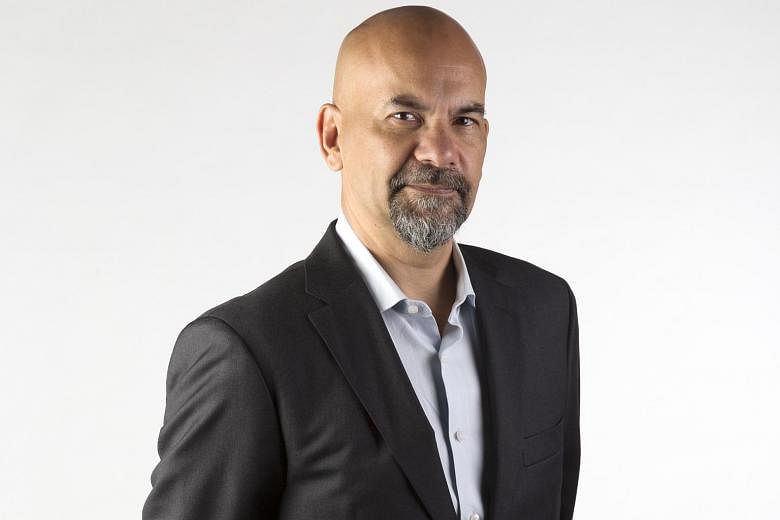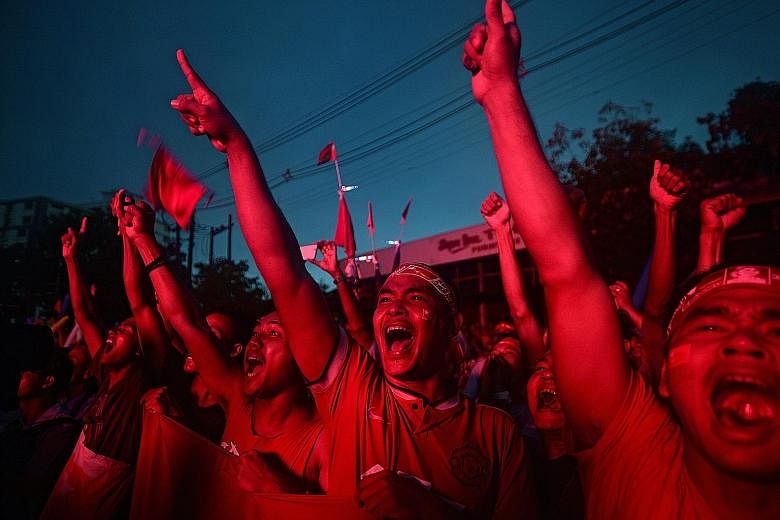Myanmar's National League for Democracy (NLD) - denied a chance to run the country in 1990 - came back with a resounding victory in Sunday's seminal polls on a wave of emotion that has all but eclipsed the powerful army's surrogate, the Union Solidarity and Development Party.
The NLD is heading for a landslide and could end up with a huge mandate of 400 or even more seats in the 664-seat Parliament, according to some analysts.
Yet NLD leader Aung San Suu Kyi cannot be president because a clause in the junta-written Constitution bars anyone with foreign family connections from the position: Her late husband was British and so are her two sons.
-
TOP LOSERS
-
MR HTAY OO
Co-chairman of Union Solidarity and Development Party (USDP)
A retired brigadier-general and close ally of President Thein Sein, he lost his seat in Hinthada, a town in the Irrawaddy delta region south of Yangon, to his rival from the opposition National League for Democracy (NLD).
MR SHWE MANN
Parliament Speaker
The former USDP chair also lost to his NLD rival in Bago region's Phyu township. The former general, who made no secret of his presidential ambition but took a blow when he was ousted from the party's leadership in August, is technically still eligible to be nominated for the post of president. But he has little political stock left.
-
NEXT STEPS
Up for election were 498 seats in both Houses of Parliament - which make up 75 per cent of the total seats - as well as hundreds of seats in state assemblies. Voting was cancelled in Shan state on security concerns; they will likely see by-elections at a later date.
The Union Election Commission plans to announce preliminary nationwide results today, and final results no later than two weeks after the vote. The commission yesterday began making rolling announcements of results by constituency as they came in from around the country.
Myanmar has a first-past-the-post voting system likely to favour the NLD.
Under the junta-crafted Constitution, 25 per cent of seats in Parliament are reserved for military appointees, so the military commander-in-chief will name 166 appointees who, in effect, will be allies of the army-backed USDP. The military also retains 25 per cent of seats in the state assemblies.
In the next few months, the two Houses of Parliament and the military will nominate one candidate each for the presidency. The two Houses will then hold a joint vote to choose the president.
Ms Suu Kyi is constitutionally barred from becoming president.
A caretaker government, led by current President Thein Sein, will be in power till March next year, when the new government takes office.
Thus, she will in effect run the government as the real power behind the next president - who will be appointed by sitting MPs in a process that will be completed only in March next year.
Despite the mandate, the NLD may find it heavy going to meet expectations.
Changing the Constitution has been part of the party's campaign pitch. But that requires a "super majority" of more than 75 per cent of parliamentary votes, which the army can block with its reserved bloc of 25 per cent of seats.
While the NLD may still ally with some smaller ethnic parties, the size of its victory dispenses with the need for coalition partners. But the reality is that it still has to cohabit with the army.
The army controls 25 per cent of Parliament as well as regional assemblies through appointed seats. Equally important, under the Constitution, it has the power to appoint three key ministers - for border affairs, defence and home affairs.
The Ministry of Home Affairs runs the General Administration Department, which is essentially the bureaucratic backbone of the country. Myanmar's system therefore remains a hybrid one, with politics played out within defined boundaries.
"The army developed a Constitution which protects its red lines. The idea always was to allow relatively free politics within a circumscribed space," said historian and author Thant Myint U.
"Given high expectations and the excitement around democratic change, we'll see whether political leaders, over the coming months, begin to test those limits, for example, through talk of amending the Constitution."
The conduct of the elections has been cautiously praised as reasonably free and fair - and there has thus far been little election-related violence. That, in itself, in a country torn for decades by conflict on its periphery and by notoriously fractious politics, is good news, analysts said.
The business community has also noted the peaceful polls. Singaporean Argus Ang, a long-time Myanmar resident and chief executive of RVI Group, told The Straits Times that he was impressed by the way the elections were conducted. "Having calm and peaceful elections has laid the foundation for greater business commitment and investment," he wrote in an e-mail.
The NLD has a progressive economic policy platform, said economics associate professor Sean Turnell at Australia's Macquarie University, who closely advised the party's economic team.
"The ideas are consistent with modern thinking," he said.
They include more support to the smallholder agriculture sector, a feature of South-east Asia and especially Myanmar; land rights; and health and education, in which Ms Suu Kyi is said to take a personal interest.
The central bank will also be more independent, said Prof Turnell. But he acknowledged that implementation would be a challenge.
Analysts cautioned that there is considerable inertia in the system. Even former generals in current President Thein Sein's office sometimes had difficulty getting things done, one analyst said, asking not to be named.
These paradoxes will have to be skilfully managed. The biggest underlying issue, said one analyst on condition of anonymity, was the "deal with the military".
But there is reason for optimism, said Thant Myint U.
"We could have a new government which the military is reasonably comfortable with and might even choose to work with on key issues, such as the economy or peace process, at least for a little while," he said.



